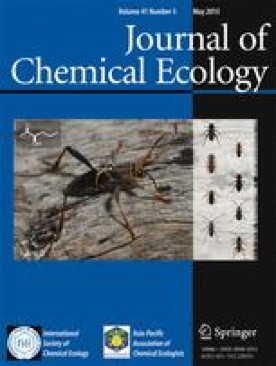- 充值
- 帮助

Journal of Chemical Ecology promotes an ecological understanding of the origin, function, and significance of natural chemicals that mediate interactions within and between organisms Original research and reviews concerning both the biological and chemical aspects of chemical ecology Official journal of the International Society of Chemical Ecology (ISCE), the Asia-Pacific Association of Chemical Ecologists (APACE), and the Latin American Association of Chemical Ecology (ALAEQ) Journal of Chemical Ecology is devoted to promoting an ecological understanding of the origin, function, and significance of natural chemicals that mediate interactions within and between organisms. Such relationships, often adaptively important, comprise the oldest of communication systems in terrestrial and aquatic environments. The strong interdisciplinary association that has developed between chemists and biologists has accelerated our understanding of these interactions in nature. Scientific contributions, including review articles, original research papers, rapid communications, and Letters to the Editor are welcome from either members or nonmembers of the International Society of Chemical Ecology. Manuscripts must be in English. They may include substantive observations of interactions in nature, the elucidation of the chemical compounds involved, the mechanisms of their production and reception, and the translation of such basic information into survey and control protocols. To be considered for peer review, the following criteria should be met: Papers must contain an ecological rationale. Papers should contain both chemical and ecological/behavioral elements. Purely chemical or ecological/behavioral papers usually are not appropriate. However, chemical papers that emphasize structure/function, or behavioral ones that demonstrate some novel phenomenon will be considered. Papers whose focus is the search for new drugs, herbicides, or insecticides are not appropriate. Applied chemical ecology is an appropriate subject matter so long as the work is based on ecological problems or concerns. Papers whose focus is environmental science should not be submitted to JCE unless the work involves demonstration of effects that disrupt chemical ecology. Chemical and molecular research and writing must follow our guidelines as articulated in JCE 34(8): 984 (chemical); JCE 35(12):1383 (SPME); and JCE (36(12):1288 (molecular). Papers must be of sufficient breadth (avoiding a regional focus) a nd novelty to have international appeal. Papers must be written in acceptable English. Writers whose native language is not English are encouraged to seek a pre-submission review by a native English-speaking writer. Preliminary work is not publishable, but short papers that either express new ideas or do not merit full paper status can be submitted in the Rapid Communication category. Papers should be 5-6 pages in length, contain one figure and/or table, and have no more than 12 references
- 主办单位: SPRINGER
- 出版周期: 月刊
- 别名: 化学生态学杂志
- 国际标准连续出版物号: ISSN 0098-0331
- 创刊时间: 1975年
-
vol.50.0 (2024)
vol.50.0 (2024)
9-10 -
vol.50 (2024)
vol.50 (2024)
-
vol.50 (2023)
vol.50 (2023)
-
vol.49 (2023)
vol.49 (2023)
-
vol.48 (2022)
vol.48 (2022)
-
vol.48 (2021)
vol.48 (2021)
-
vol.47 (2021)
vol.47 (2021)
-
vol.46 (2020)
vol.46 (2020)
-
vol.45 (2019)
vol.45 (2019)
-
vol.44 (2018)
vol.44 (2018)
-
vol.43 (2017)
vol.43 (2017)
-
vol.42 (2016)
vol.42 (2016)
-
vol.41 (2015)
vol.41 (2015)
-
vol.40 (2014)
vol.40 (2014)
-
vol.39 (2013)
vol.39 (2013)
-
vol.38 (2012)
vol.38 (2012)
-
vol.37 (2011)
vol.37 (2011)
-
vol.36 (2010)
vol.36 (2010)
-
vol.35 (2009)
vol.35 (2009)
-
vol.34 (2008)
vol.34 (2008)
-
vol.33 (2007)
vol.33 (2007)
-
vol.32 (2006)
vol.32 (2006)
-
vol.31 (2005)
vol.31 (2005)
-
vol.30 (2004)
vol.30 (2004)
-
vol.29 (2003)
vol.29 (2003)
-
vol.28 (2002)
vol.28 (2002)
-
vol.27 (2001)
vol.27 (2001)
-
vol.26 (2000)
vol.26 (2000)
-
vol.25 (1999)
vol.25 (1999)
-
vol.24 (1998)
vol.24 (1998)
-
vol.23 (1997)
vol.23 (1997)
-
vol.22 (1996)
vol.22 (1996)
-
vol.21 (1995)
vol.21 (1995)
-
vol.20 (1994)
vol.20 (1994)
-
vol.19 (1993)
vol.19 (1993)
-
vol.18 (1992)
vol.18 (1992)
-
vol.17 (1991)
vol.17 (1991)
-
vol.16 (1990)
vol.16 (1990)
-
vol.15 (1989)
vol.15 (1989)
-
vol.14 (1988)
vol.14 (1988)
-
vol.20 (1987)
vol.20 (1987)
-
vol.13 (1987)
vol.13 (1987)
-
vol.12 (1986)
vol.12 (1986)
-
vol.11 (1985)
vol.11 (1985)
-
vol.10 (1984)
vol.10 (1984)
-
vol.9 (1983)
vol.9 (1983)
-
vol.8 (1982)
vol.8 (1982)
-
vol.7 (1981)
vol.7 (1981)
-
vol.6 (1980)
vol.6 (1980)
-
vol.5 (1979)
vol.5 (1979)
-
vol.4 (1978)
vol.4 (1978)
-
vol.3 (1977)
vol.3 (1977)
-
vol.2 (1976)
vol.2 (1976)
-
vol.1 (1975)
vol.1 (1975)
- 1
- 2
- 3
- 4
- 6

 分析评价
分析评价
